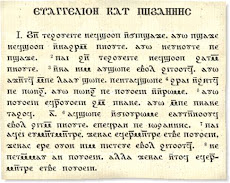But they show that they are not really listening to what he said. They use words from Dr. Layton in conjunction with his Coptic grammar book, ie., "The indef. article is part of the Coptic syntactic pattern. This pattern predicates either a quality (we'd omit the English article in English: "is divine") or an entity ("is a god"); the reader decides which reading to give it. The Coptic pattern does NOT predicate equivalence with the proper name "God"; in Coptic, God is always without exception supplied with the def. article. Occurrence of an anarthrous noun in this pattern would be odd."
The strange thing here is that Dr. Layton is actually agreeing with what other similarly-respected Coptic grammarians have also written, and his words actually support the "Word was a god" translation. First, the Coptic noun noute, "god," is not a quality. It represents an entity, thus, as Layton says, the indefinite article before the entity, noute can be translated as "a god." (Dr. Layton confirmed the same to me by e-mail dated October 9, 2006)
Second, Dr. Layton says that "God is always without exception supplied with the definite article." But at John 1:1c, "God" does not have the definite article. Therefore, John 1:1c does not say "the Word was God." Trinitarian apologists who quote Dr. Layton should note that his words here do not support the popular translation, "the Word was God." Although Dr. Layton says "The reader decides which reading to give it," this should be on the basis of the type of Coptic noun the indefinite article qualifies.
Certain types of Coptic indefinite nouns do not need to have the indefinite article translated by "a," but the Coptic noun noute, "god" is not one of those nouns. With noute and nouns of its class, the "a" is translated, as shown by Coptic grammarian Thomas O. Lambdin's example in his grammar book, where he translates ntof ounoute pe as "he is a god." -- Thomas O. Lambdin's Introduction to Sahidic Coptic, page 18.
Some Trinitarian apologists also quote George Horner's translation "[a] God was the Word," wherein Horner puts brackets around the "a" as if the "a" is not really needed. But Horner was very inconsistent in translating the Coptic "a" into English. He put brackets around it at John 1:1c, but there are numerous examples in his translation where the exact same Coptic construction exists and he does not put the "a" in brackets. Perhaps theology, not grammar, lies behind Reverend Horner's use of brackets at John 1:1c in his English translation. The "a" belongs there, and without brackets, and Horner himself routinely uses the "a" in the indefinite construction!
Coptic researcher J. Warren Wells of the excellent, well-documented Sahidica Project is sometimes mentioned by the Trinitarian apologists as a knowledgeable person who is not sure if John 1:1c should be translated as "the Word was a god." So I asked Wells personally. Mr. Wells has 30 years in Greek studies and 20 years of Coptic study, and Wells has confirmed positively that the Coptic version of John 1:1c literally does say, "a god was the Word."
Trinitarian apologists will continue to chafe at the inconvenience for their theory that the Coptic translation provides. Here is an ancient Bible translation (2nd-3rd centuries) that confirms the very reading of the New World Translation, which the Trinitarian apologists have attacked for over 50 years. But they can't accuse the Coptic version of being translated by "Freddy Franz" or by scholars with no knowledge of Greek. Greek was a part of Coptic civilization for 500 years. So, they try to find "experts" who will blunt the impact of the Coptic reading.
But the evidence for "the Word was a god" or similar -- "the Word was a divine being," "the Word was like God," etc. -- in the Coptic version is solid.